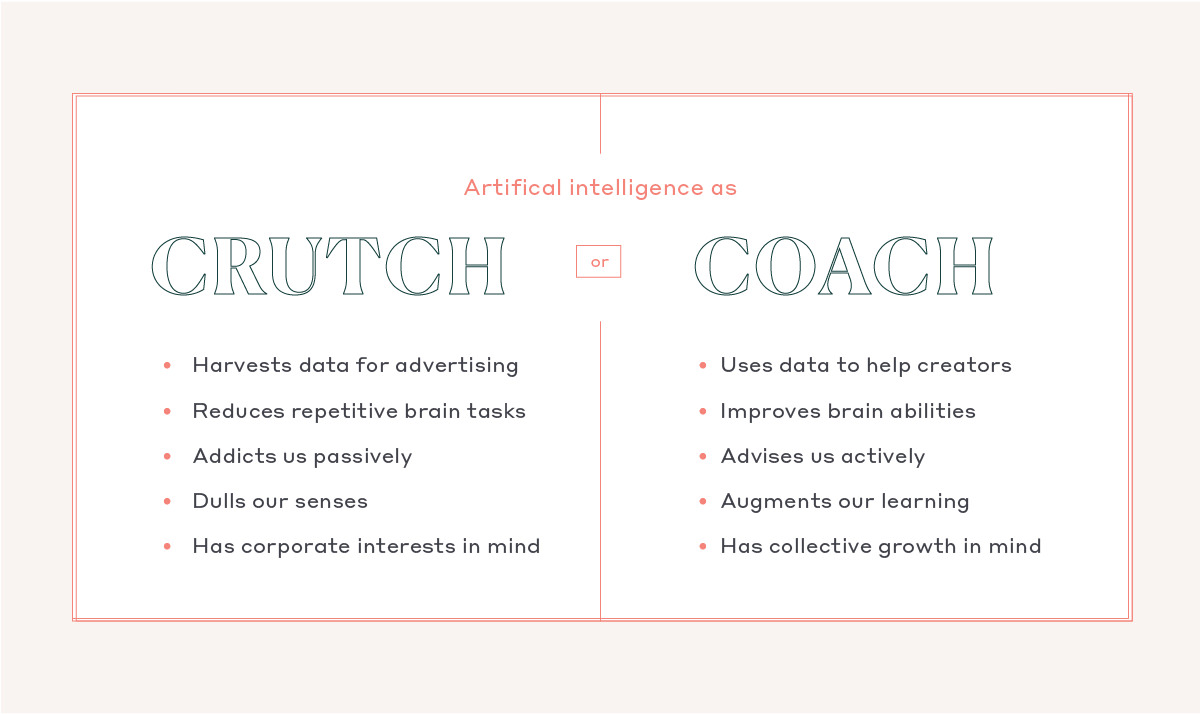How Coaching Networks Will Create the First Facebook-Scale Enterprise Business
AI is coming one way or another; what matters is how we respond.
The onset of AI in the workplace raises a set of important questions that deal directly with this reality: How can we use artificial intelligence to help us get better at our jobs while learning necessary new skills along the way?
There’s a big debate going on in policy and tech circles over whether or not artificial intelligence will turn out to be a good thing or a bad thing for society.
One side sees AI primarily as a job destroyer, while the other sees it as the means to liberate workers from mindless administrative tasks. Both sides are missing a bigger point: AI is coming one way or the other; what matters is how we respond.
The onset of AI in the workplace raises instead a new set of far more important questions that deal more directly with this reality: How can we use artificial intelligence to help us constantly get better at our jobs, learning necessary new skills along the way? How can AI be used to help workers rise above the mundane tasks it is automating away?
The answer is something we’ve dubbed Coaching Networks, and it forms the foundation of a major advance in how we think businesses will use software to augment the capacity for human learning. We also believe Coaching Networks will drive the creation of the next generation of iconic enterprise software companies.
Here’s why: For 40 years, business software has essentially replaced processes that previously required paper forms. At Emergence, we’ve seen the power of replacing these processes via multi-tenant web-based software from our first investment in Salesforce.com. While this shift to the cloud has been a huge breakthrough, it is largely the same forms experience for users. As AI capabilities improve, we can either treat it as a crutch that relieves us from thinking — examples include Waze and Google Maps — or as an asset that helps us use our brains more effectively and creatively.
Our hope is that we choose to win the race against automation by choosing the latter. Otherwise we’ll be overtaken by the automation curve: Human workers will simply be cogs in business processes driven by machines. At that point the race will be lost. It may sound extreme, but Coaching Networks give humanity a fighting chance.
We think dynamic coaching will finally replace the old forms-based paradigm. Instead of giving us static workflows and reporting tools, this new software will help us get better at our jobs.
Gordon Ritter
General Partner, Emergence
The key ingredient of Coaching Networks is software that gathers data from a distributed network of workers and identifies the best techniques for getting things done.
The software acts as a real-time, on-the-job coach, guiding employees to successful outcomes, and in the process gathering new data that’s then fed back into the system. Rather than dispensing “one-size fits-all” advice, it instead offers coaching that’s uniquely tailored to each worker and the task they’re doing at any given moment.
Coaching Network software gets better over time by learning the best practices that are proven effective across a variety of situations, identifying those outlier cases where a creative person finds a new, better solution, and adds those techniques to its coaching. This allows others to learn from the experience of those more creative workers. This is how humans become the “mutation engine” in this evolving process, generating new ideas which in turn benefit everyone else.

Coaching Networks can also help solve other problems: Remote workers can be trained more easily. Where you work will become less important than how good you are at your job, and how flexible you are at improving your skills.
We think Coaching Network-based companies will rise in nearly every sector of the economy, especially related to sales and service jobs where human-to-human interaction is essential. Interpersonal communication is dynamic and nuanced in ways that only humans can fully grasp and changes from place to place. It can never be fully automated, but machines can coach humans in ways that improve our decisions.
There are already some companies that are showing the way forward, and we think they exhibit some core principles that will set successful Coaching Network companies apart from the pack.
Go deep, not big, with data
Successful Coaching Network companies focus on a narrow set of problems within a specific domain or field; they avoid the broad “apply AI to everything” approach popular among many startups today.
Sweat your data, not your algorithm
The best Coaching Network companies will use open source tools like Google’s TensorFlow or Amazon Machine Learning. Don’t obsess over creating a unique algorithm —that isn’t your company’s intellectual property: Your proprietary user behavior data is.
Make it useful—make it visible
Successful Coaching Network companies must work hard to build a user experience that encourages its use. Coaching UIs that are intrusive or annoying discourage use. Lack of use leads to a lack of fresh data, which is deadly for this new networked software.
Coaching Networks
Guru
Guru has created a clever Chrome browser extension that links workers to the institutional knowledge they need to complete certain tasks. Inside every company there are tasks that require a unique workflow.
This knowledge tends to get scattered into any one of several miscellaneous documents on a corporate intranet or file storage system, but it mostly lives in the heads of employees. When Guru notices someone doing one of these tasks in Gmail, Salesforce, Zendesk, Slack or other applications, it automatically surfaces related information, in context, and in real time.
Employees — especially those who are new on a job — like it because it saves them the time it takes to look up the information they might need, so they keep using it. The high rate of usage creates more valuable data on what works best, which helps Guru make better suggestions over time. Since deploying Guru, Shopify has seen a five times increase in knowledge base usage, speeding up critical processes. Intercom has seen a 60 percent reduction in the time it takes its support team to respond to customers.
As Coaching Networks takes hold in large enterprises, we may finally see an enterprise software company ride the network effect with their data to achieve significant scale.
The big gorilla in the space is Salesforce.com whose market capitalization recently passed the $70 billion mark. Successful as it is, Salesforce is much smaller than Facebook ($500 billion market cap.) and Google/Alphabet ($650 billion.)
There’s a reason for this disparity: No enterprise company — with the arguable exception of LinkedIn — has yet fully harnessed this network effect with their data the way the consumer Internet giants have. We think the first enterprise company to do it will be built around a Coaching Network, and will dwarf today’s gorillas.
Enjoying this article?
Sign up to gain access to our thought leadership and have future articles delivered directly to your email.
